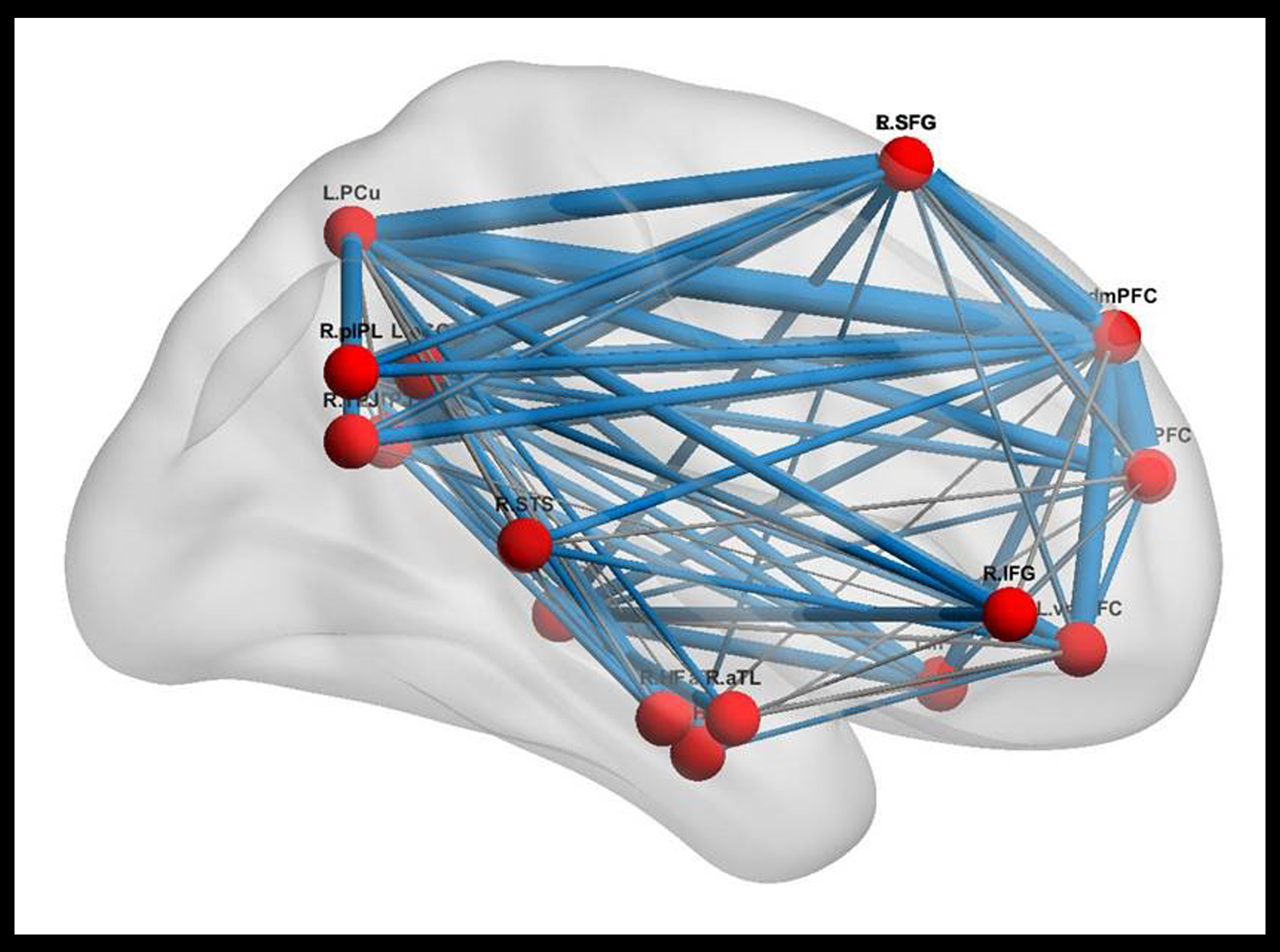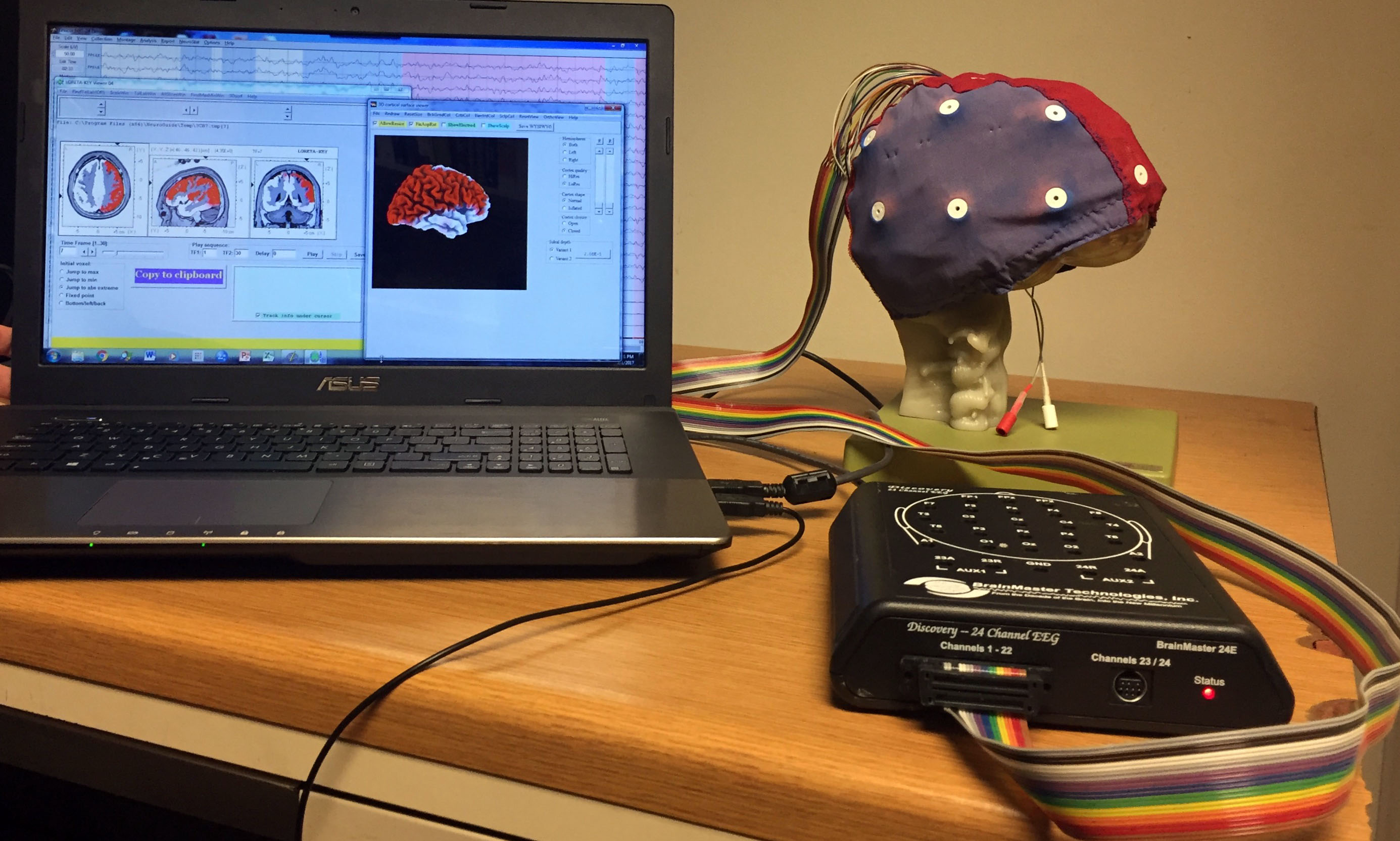 This is an example of a deregulated network seen in people with chronic fatigue syndrome. Note that nearly all the connections are deregulated, producing a wide range of symptoms. (DePaul University/Center for Community Research)CHICAGO — A team of researchers from the Center for Community Research
at DePaul University are on a mission to better understand why the brain is
less efficient in people with chronic fatigue syndrome (CFS), a disease that many
patients refer to by its original name, myalgic encephalomyelitis (ME). This illness
is characterized by extreme muscle exhaustion, cognitive deficits, as well as unrefreshing
sleep. The innovative systems level approach utilized by the research team may
lead to important answers about this disease, they note.
This is an example of a deregulated network seen in people with chronic fatigue syndrome. Note that nearly all the connections are deregulated, producing a wide range of symptoms. (DePaul University/Center for Community Research)CHICAGO — A team of researchers from the Center for Community Research
at DePaul University are on a mission to better understand why the brain is
less efficient in people with chronic fatigue syndrome (CFS), a disease that many
patients refer to by its original name, myalgic encephalomyelitis (ME). This illness
is characterized by extreme muscle exhaustion, cognitive deficits, as well as unrefreshing
sleep. The innovative systems level approach utilized by the research team may
lead to important answers about this disease, they note.
Using electrical neuroimaging, research scientist Marcie Zinn, senior
research associate Mark Zinn and professor Leonard Jason, are working to
determine the reasons for the brain problems commonly seen in this disease. Their
research could potentially lead to improved diagnoses and understanding of the
disease, which has debilitated over 17 million people worldwide.
“People become traumatized by a debilitating illness and then become
traumatized again by the reaction to them by people who don’t understand,” said
Jason, professor of psychology and director of the Center for Community
Research at DePaul. In addition to finding the source of many chronic fatigue
syndrome symptoms, their research focuses on debunking the stigma surrounding the
disease.
“This research will examine biological issues involved in this
illness,” Jason said.
“We know that different regions of the brain have to work together to
process information, and problems in those networks can produce many symptoms in
patients,” said Marcie Zinn. “These brain problems in CFS could be the result
of bad and/or slow connections,” she noted.
EEG versus functional MRI
In order to gather data for their current study, the research team
analyzes responses from online surveys and assesses results from individual
30-minute electroencephalograms (EEGs), a test that measures brain waves.
“With the approach we use, we can see the brain at the millisecond
level, which is 1,000th of 1 second. That’s the timeframe your brain works in. In
contrast, there is about a 2 or 3 second delay with the functional MRI,” Marcie
Zinn said.
 Using electrical neuroimaging, a team of cognitive neuroscientists at the Center for Community Research at DePaul University, is working to determine the reasons for the brain problems commonly seen in chronic fatigue syndrome. In order to gather data for their current study, the research team assesses results from individual 30-minute electroencephalograms (EEGs), a test that measures brain waves. (DePaul University/Jordyn Holliday)
Using electrical neuroimaging, a team of cognitive neuroscientists at the Center for Community Research at DePaul University, is working to determine the reasons for the brain problems commonly seen in chronic fatigue syndrome. In order to gather data for their current study, the research team assesses results from individual 30-minute electroencephalograms (EEGs), a test that measures brain waves. (DePaul University/Jordyn Holliday)A key difference in these two methods is that the quantitative EEG
looks directly at the brain cells, while the functional MRI looks indirectly at
the brain cells, she noted.
The researchers’ hope is that their work will help gain a better sense
of the possible causes of chronic fatigue syndrome. Physicians, psychologists and
other health care professionals then may be better equipped to target
treatments to help correct deficits.
Mark Zinn also compared their quantitative EEG approach to social
networks.
“We’re studying interactions in the system of the brain,” he said. “We
are studying relationships between neurons,” he explained, adding that a major advantage
of their approach is that they examine the brain on a systems level.
“Our focus is to link patients’ signs and symptoms to functional
systems in the brain, which contrasts with traditional attempts to link
patients’ symptoms to brain lesions and other physiological abnormalities,”
Mark Zinn said.
Their innovative systems level approach has been previously published
in Applied Psychophysiology and Biofeedback in 2016.
Center for Community Research
Jason said DePaul’s Center for Community Research has been researching
and addressing chronic fatigue syndrome and myalgic encephalomyelitis for 25
years. “We have had years of experience in this area, and the nature of our
work provides us at DePaul unique opportunities to better understand its
etiology and pathophysiology,” he said.
The results of this latest research may shed light on how brain
function relates to the symptoms confronted by patients. It involves studying patients
and controls. Those interested in participating or who have further questions
should contact Marcie Zinn at mzinn1@depaul.edu
or 877-963-8763.
The mission of DePaul University’s Center for Community Research is to
provide permanent, dedicated space for externally funded research projects and
to house research projects of colleagues associated with the work from psychology
and related disciplines. The center is a setting where applied researchers can
have an infrastructure to pursue their research. Additional information is online
at http://csh.depaul.edu/about/centers-and-institutes/ccr.
###
Sources:
Marcie Zinn
mzinn1@depaul.edu
Mark Zinn
mzinn@depaul.edu
Leonard Jason
ljason@depaul.edu
Media Contact:
Russell Dorn
rdorn@depaul.edu
312-362-7128